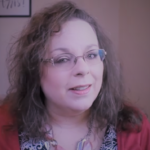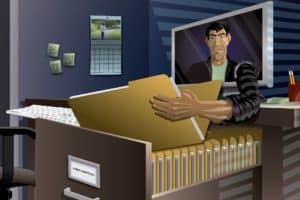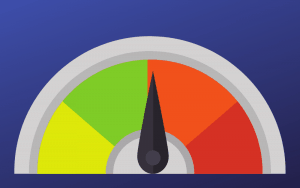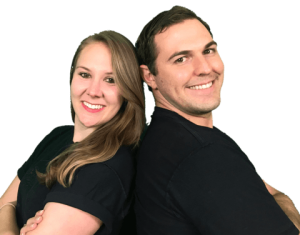Denis O’Brien [0:37]
Welcome to Episode 202. The Budget Bounce, Hey money clan, a very warm welcome to the Chain of Wealth podcast. I’m your host, Denis O’Brien.
Katie Welsh [0:49]
And I’m Katie Welsh.
Denis O’Brien [0:50]
Katie, this conversation absolutely blew me away. And I really have a lot of respect for Jen.
Katie Welsh [0:57]
Holy moly, talk about inspirational. Jen and her family have taken full rein and responsibility of the debt that they have. And they are just slowly but surely chipping away at over $250,000 worth of debt.
Denis O’Brien [1:16]
Yeah, it’s a lot of debt. But Kate what I really appreciate about them is their attitude towards it all as well. They are ready to tackle it. And they don’t have much time to knock it out and get ready for retirement as well. So they’re really focused on juggling a lot of stuff. But I think that they’re doing the right thing, the focusing, they are determined to make it work for them. And I really think that Jen and her family are really going to do well and achieve their goal.
Katie Welsh [1:40]
It’s stories like this, Den that when I was paying off my debt just helped push me a little further along. And I think that through Jens YouTube channel, and you know, just getting the word out and encouraging other people, she is going to do so much more good than what she probably thinks she’s going to.
Denis O’Brien [2:1]
I totally agree with you. Anyway, before we dive into today’s show, if you guys haven’t already, don’t forget to join our Facebook community. You can join us it’s chainofwealth.com/group, and come and tell us what you’re busy working on. All right, Kate are you ready to dive into today’s show?
Katie Welsh [2:16]
Yeah,
Denis O’Brien [2:17]
Fantastic. Let’s do it.
Voice Over [2:19]
Welcome to Chain of Wealth. Here’s your host, Denis inspiring you to begin your journey of financial freedom.
Denis O’Brien [2:32]
Facing financial ruin, Jen started a YouTube channel to have an outlet to talk about her family’s financial struggles. After her husband became ill and was unable to work for almost a year in 2017. Living paycheck to paycheck with no savings. They were immediately behind on debt payments after her husband missed his first check. She shares the ups and downs of living life on a budget and tackling a $252,000 mountain of stupid debt. Over at her channel The Budget Bounce. Welcome Jen.
Katie Welsh [3:6]
Hey Jen.
Jen Bohler [3:8]
Hi, guys.
Katie Welsh [3:9]
So Oh, my goodness. $252,000 worth of debt.
Jen Bohler [3:16]
Yeah, kind of scary.
Katie Welsh [3:18]
And you said it’s stupid debt. What to you mean, stupid debt? Is it like credit cards like, oh, what would that entail?
Jen Bohler [3:27]
Well, it’s kind of a mixed bag, a little bit of everything. So we had medical bills in there. They were relatively small, very small percentage. We had a couple of 401k loans. We had two car loans. We had my husband’s student loans from he went to school from 2009 to 2013. So we had those student loans. And we he also had back child support to pay. And we had a family loan. And then on top of all of that 21 credit cards.
Denis O’Brien [3:59]
Oh, my goodness. Oh, that’s impressive.
Katie Welsh [4:2]
Yeah.
Denis O’Brien [4:3]
So what was kind of the moment that you were like, All right, let’s actually add it all up and figure out where we’re at what when did that moment really come?
Jen Bohler [4:42]
It was actually, it was a very cold morning in January of 2018. And I literally had my sick and tired of being sick and tired moment. And my husband had been sick and not working. And he was not getting better at this point. And we didn’t know when he was going to get better. And I am the breadwinner of the family. Anyhow, but he not having his income I it wasn’t till he stopped working, we realized that his income was basically paying for our debt
Denis O’Brien [4:42]
Right.
Jen Bohler [4:42]
And so I had been carrying that and the worry and concern about his health because he was he was very ill. And just to be up front because we do talk a little bit about this. On the channel. He was experiencing severe anxiety and depression it was it was debilitating. And he had never experienced anything like that in his life. And so he didn’t know how to handle it. And I was struggling to help him, even though I understood it because of my own experience with it. And so now here we are, that had started in July of 2017. It’s January of 2018. And the collectors were just calling incessantly they were just they were so relentless. And it was a Saturday morning. And it was just before noon. And the seventh collection call of the day came in. And I was in the car with my husband and I had been really trying to deal with and handle this stuff myself. Because he really was not in a position to handle this, because of all the other things he had going on. And I I just basically kind of lost it in the car and started crying. And I said I can’t I can’t do this, I can’t do this anymore. I cannot continue with the calls. And we have to do something. And the only thing that I feel like I can take control of right now is our finances. And so we’re going back on a budget. And it had been like nine years, we hadn’t been on a budget. And so about 10 or 11 days later was February 1 and our very first budget.
Katie Welsh [6:21]
So going back to that day, I’m sure like it was the worst feeling. But when you got home from that car ride, did you like walk in and immediately tally up all of your debt and was it more or less debt than what you had kind of planned in your head is surely kind of like had a rough estimate. But not like a for sure amount?
Jen Bohler [6:44]
Yeah, so first of all, I’m a nerd when it comes to spreadsheets and money. And all of that I had been tracking my things going back to long before I met my husband, I had had a spreadsheet since like 1997 or something stupid like that. And so I had always had my thumb on it. But I before my husband got sick, I felt a starting to hit the tipping point I saw it coming. It was almost like it was in slow motion, I manage all of the money for the for the household. And I saw us with our terrible spending and not managing our money at all. And I didn’t know how to slow down the train because I didn’t have the strength to fight it. And it was easier and less uncomfortable to just go keep going as is. And my husband getting sick really forced us to to make the decision to make the changes. So what happened me being that nerd I went Yes, I literally went straight to the office. And I spent the most of that day and the next day, gathering information working on spreadsheets and that kind of thing to try to tackle and bring it all in. Because during that time, when that train when slow down, I stopped watching it closely. Because I was scared. And so when I put that all together that day, it was actually $249,000 that day, but I had a feeling there were some other things out there that I hadn’t found yet. And yeah later ended up taking us to 252.
Denis O’Brien [8:20]
Wow so sort of like you were just like basically doing the ostrich technique you like put your head in the ground and pretend like nothing’s going on. Until all of a sudden you realize that you know like, Okay, this has got to stop like it’s out of control. You’re getting the creditors like literally on your back at you all the time. And you’re like, Okay, it’s time to bring about a change. So fire up the spreadsheet, you add up all your debt. And then you get your number and what was your reaction when you when you saw that?
Jen Bohler [8:48]
I you know, I don’t remember really clearly what my thought was when I saw it. It was more how I felt when I talked to Matt about it. Because I just felt like I had I really felt like I had let us down because he had his his practices before we met. We’ve been together 12 years before we met he lived as an ostrich he let things go by him and that kind of thing. And that was not my m.o at all. I’m very, very assertive and aggressive in you know, knowledge is power. Right? So if you know what you’re dealing with, you can tackle anything.
Denis O’Brien [9:28]
Yeah.
Jen Bohler [9:29]
But But I, I got so scared of the knowledge that I let it get by me and and I had told him a couple of different times that I hadn’t been keeping an eye on it. But I didn’t ever really talk to him about it until you know after we actually I remember we went out for coffee. And on free pie day. I don’t know if you guys have VillageInn where you are. But that’s a restaurant here. And it was free pie Wednesday.
Katie Welsh [9:55]
No, but we need one of those. I grew up by a VillageInn and I didn’t know there’s free pie Wednesday.
Jen Bohler [10:3]
There is here. Yeah, so we went out for coffee and pie. And I took my laptop and we just laid everything out. And when I was I remember I was very emotional. And, and I felt terrible for laying it on him. But I felt like I couldn’t start us on this journey without getting him up to speed. So yeah, it was more guilt. It was really how I felt when I talked with my husband.
Denis O’Brien [10:34]
Yeah. So I imagined then after that I was like, all right, well, you know, like you’ve had you both had the time sort of process it. And you know, like, have a pity party and everything else and get over the initial hump of like, Oh, my word, this is a massive mountain. What was your strategy, then? Well, you like, let’s pay it off. Like how did you sort of determine how you were going to pay it off?
Jen Bohler [10:56]
So first of all, one of the things that we were blessed with, aside from having all this this awful debt was we had a really nice income, that actually once we told our money what to do, we had plenty of money to pay for our debt with two incomes. The problem at the time was we didn’t have two incomes, we only had one, because my husband was off work. And he he only got for the 10 months he was off, he only got six weeks of disability, he fought it the whole time. And they denied everything. That is a big gap in you know, here in the United States with with mental health issues. And it we even consulted an attorney, and we couldn’t find anybody to take it because it wasn’t enough to fight for. So we had nothing coming in. And so we learned that we have plenty to live on with my income. That’s great we can we had no concerns about losing the house, or the cars or anything like that, that we needed to go to work so that we could keep the house and whatnot. But until we got that second income coming in, it was really tight. And I hadn’t set up all the payment plans yet with all of the creditors that we owed, I mean, we were so far behind. And I spent, I tried to make two to three calls a month, I think is how I did it. I can’t remember what my number was my strategy was to set up payments plans with all the things that had my name on them, because they would talk to me. And those calls were all very emotional, they were very draining. And so my first goal was let’s we’re already we got these things that we’re paying like normal, we had a couple of credit cards that we never lost sight of, we always paid those and we’re up to speed with. But then the next thing we needed to do was tackle all these, these things that had been charged off, or we’re about to be charged off. And I wasn’t able to cut all of that from happening. And so I started there. And then in the middle of it, Matt asked me to focus on the debts that had my name on them. And during this time, by the way, I had, I had never not paid all my bills ever in my life. So I’m in my mid 40s, I have been an adult for 25 years, and I’ve never not paid a bill. Now I’m not paying a whole lot of them. So he knew how much that upset me and wanted to focus there. The other thing that he felt really strongly about was that we have an emergency fund of $3,000. And I fought him on that at first. But there were things that happened later in 2018, that proved that, you know, we definitely need to have more than just $1,000. So those were our first big things, right, get some money in an emergency fund, and then try to get all of our payments going so that we were getting back up to speed on everything.
Katie Welsh [14:9]
I like how you had your strategy of calling, you know, two to three different creditors a month just because you can’t tackle it all in one day. Or you’re just going to basically wipe yourself out. I want to ask, if at any point did you ever consider just like filing for bankruptcy any kind of like federal help or any kind of programs? Or, you know, what were you looking at any of that?
Jen Bohler [14:38]
I was pretty adamant about not doing that. And I I remained so for the most part today. And my husband had been through bankruptcy before. So he was married before me. He he had been through bankruptcy through his divorce. And so he had experienced all of this before. And so for him, he thought that was a good idea. And that was a good way to go. But we honestly didn’t even have money to pay for a bankruptcy. Like, we couldn’t save two nickels? How are we going to come up with several hundred dollars to file for bankruptcy. I mean, like I couldn’t see the forest through the trees on anything when it came to that whole solution. So I told him, I’m not doing that with my debt. And when we looked at his debt, when you his student loans cannot you cannot put those through bankruptcy and child support, you cannot put through bankruptcy and the other things that he has that have his name on them total $9,000. Why in the world, are we going into bankruptcy for that? Yeah, that’s a good point. So that’s why we haven’t done it for him. And, again, I felt really strongly we did go to before this happened like the year before we went to a Consumer Credit Counseling place here locally. And they came up with a plan for us, which would have worked great, but we weren’t ready to stop our crazy spending habits. And we so because of that we couldn’t see how in the world, we could possibly do that. So we didn’t do it. And so fast forward, I went to a conference last year called Fin Con, and met up with somebody who I was fan-girling with her. I don’t know if you guys know Sarah from Budget Girl, she was there. And she spent, we went to a debt free community meetup off site one evening, and she spent a lot of time talking with me, and encouraging me to reconsider about what we were doing with old debts, things that had been charged off that kind of thing, and to consider trying to settle them. And so and she explained the philosophy behind that, and actually, it made complete sense to me. And so we have done that with a couple of different things as they’ve come up. But for the most part, my whole thought process, when it comes to this is I did this, I spent this money, we spent this money, Matt spent this money, we as a couple spent this money, and we need to pay it back.
Denis O’Brien [17:11]
I really like that.
Katie Welsh [17:12]
Yeah that’s really noble,
Denis O’Brien [17:13]
You know, like really taking it by the horns and saying, you know, like, this is what I’ve done, I’m gonna be responsible for it. And like, I just want to go back to a point you mentioned earlier is that you were given a plan, and you didn’t want to adjust your lifestyle at that point. And I think that this is debt for a lot of people that like haven’t realized yet how much debt they’re in. And you know, like, knowing that they can actually tackle it, it is a mindset change. And it’s also a lifestyle change. And you have to really be ready for that to sort of get that that next step going, you know, like, you need to be mentally like, Alright, I’m gonna tackle this debt. And that’s going to be my focus. And when you focus on something, it becomes your reality. And on that topic, how much have you managed to pay off so far of your 252,000.
Jen Bohler [18:1]
So as of the end of this month, which February, March, April, this is our 19th month, it’s August of 2019. So, as of the end of this month, we will have paid off $42,000
Katie Welsh [18:16]
Holy cow.
Denis O’Brien [18:18]
That is awesome.
Katie Welsh [18:19]
That’s huge.
Jen Bohler [18:20]
Thank you. Yeah, we’re pretty excited about it.
Katie Welsh [18:23]
That is probably, such like a load off of your shoulders.
Jen Bohler [18:29]
Yeah, it was really. So in July, I realized that we’d paid off $40,000. And I don’t know why 40 did this for me when 30 and 20 didn’t. But I just all of a sudden realized that is a huge chunk of change. And so I just got really excited and re motivated, and, you know, really enthusiastic, and the thing is that it was coming on the on the tail end of a extremely bumpy part of our ride. May and June were incredibly difficult financially. And we ended up wiping out our emergency fund. And so that just, you know, was keeping me awake at night. And anyway, we had to tap into sinking funds that we had to help pay for all of these things that came up unexpectedly. And we had been had all of this like for 8 or 10 weeks, I had been just hoping to live through it and be able to cash flow everything we needed to. And we were we were able to do that. And then at the end of July, to find out we were $40,000 down was just, it was just such a great feeling.
Katie Welsh [19:41]
I think a lot of people can relate to exactly what you just said. Because when you are in a mountain of debt, and like just in the thick of it, and you’re just paying and paying and paying, you don’t always realize how far you have come. Because you’re just so entrenched in chugging along, that you have actually made such a huge dent. And it is really, re motivating.
Jen Bohler [20:11]
Absolutely.
Katie Welsh [20:12]
So what are your plans going forward? So I, I’m just going to assume, especially if you are a spreadsheet junkie, when is your like final pay off range of time, when are you planning to have all this done by, if everything goes according to plan.
Jen Bohler [20:32]
So if we continue at the rate that we’re going now, which we are not to use a Dave Ramsey term, we are not Gazelle, intense, our minimums by themselves are $2700 a month. So to be, you know, to go beyond that, you know, is a stretch. And so right now, we are able to pay the minimums on the things that we we have a group of actively paid, debts that we are working on, there’s a whole group that is sitting to the side, that we will deal with all of those that belong to Matt that total that $9,000 and also his student loans have been deferred. The next thing we have to do is we’re going to get his student loans. While he may still be deferred this year on his income driven repayment plan, which we will be I think re upping I think we have to reapply for that next month, I think or October one of the two, he’s probably going to be deferred again, because he didn’t work half of 2018. But we are going to start paying the interest on those because those $38,000 in student loans that he had when he graduated in 2013, and came up in 2014 are now $51,000.
Katie Welsh [21:44]
Sadly, I know that story all too well.
Jen Bohler [21:47]
I know you do, Katie,
Denis O’Brien [21:50]
Yeah, but like, one of the nice things, though, is that, you know, when you are paying back such large amount of debt, when you start making like those chips away from all that big principal balance, the amount of money you have left over increases, because, you know, like, once you’ve paid the interest, anything else you pay as extra off the total principal of the line. So as time goes on, you’re able to pay more and more towards the principal and less towards the interest because it’s on a smaller balance. So the nice thing is for you guys is that, you know, the the first 40,000 will be the hardest 40,000 for you guys. After that point, it should kind of have like a snowball effect in that, you know, each month is going to be less interest to pay, and you’ll be able to put more money towards the principal, which is really, really cool.
Katie Welsh [22:37]
Yeah, we’re and we are. So looking forward to that. Right now, we haven’t been able to pay off the things that have interest on them. And so that’s like our 401k loan, our car loan, his student loans, he’s got a private student loan as well that we currently pay on we’ve been paying on since 2014, you know, like paying down like $13 a month because the interest is so high,
Denis O’Brien [22:59]
Right.
Jen Bohler [23:1]
Anyhow, when we can start tackling those things, I that’s when I’m really going to start when the interest actually stops accruing on those. I also have a credit card that’s killing us right now. And once I can see that, that is really I’m going to really feel like we’ve you know, gotten some some is it leverage? Is that the word I’m looking for, we’ve really we’re going to start getting some momentum.
Denis O’Brien [23:26]
Yeah, I would say momentum is the better word. Yeah, it’s kind of like when you start at the top of the mountain, you know that first little, almost like snowball that goes down to the smallest, and it just gets bigger and bigger as it gains that momentum going down. That’s what’s going to happen to your guys’ balance. So really exciting. And you’ve done such a good job already paying back so much debt and such small amount of time. So if you’re ready, just maintain what you’re doing, you know, you guys are on the right track, and you’re going to really crush your bets.
Katie Welsh [23:53]
Yeah, I think it’s really admirable especially, you know, your debt is not the only thing that you’ve been handling, you’ve also been dealing with life. And you know, you said before the show, you’re a grand mom. So you’re obviously a mom before your grandmother.
Jen Bohler [24:9]
Yes.
Katie Welsh [24:39]
You’re juggling all this stuff, along with, you know, paying off your debt and staying focused and everything. And I think that is really, really admirable.
Jen Bohler [24:21]
Well, thank you.
Katie Welsh [24:21]
You’re welcome.
Jen Bohler [24:23]
It’s just living everyday over here.
Denis O’Brien [24:26]
That’s all you can do.
Katie Welsh [24:28]
Exactly, exactly. And at the beginning, let me tell you at the beginning, getting through the day was hard, it was really hard, because we had so many other things going on with my husband’s illness,
Denis O’Brien [24:39]
Right.
Jen Bohler [24:39]
And I, I also suffer from mild depression I have for 20 years. So you put those two things together, and now I’m carrying everything, and I’m trying to figure out how we can get through this together. And so dealing with the finances, while that was going on was of course much, much harder. Once he was able to go back to work, then it wasn’t just a relief, because we were now going to have the money coming in the other relief that I had. That helped me shift my focus more to our finances was that I didn’t have to worry about how he is because it was really scary for a while. And so once I didn’t have to worry about those things, we really were able to to kind of dig in and really make some some progress early on. We’ve paid off, I think it’s 17 different debts that we’ve paid off so far.
Katie Welsh [25:41]
Wow.
Jen Bohler [25:41]
So yeah, that’s what that $40,000 comprises, is comprised of.
Katie Welsh [25:47]
So I want to pivot a little bit away from your debt and more towards your YouTube channel.
Jen Bohler [25:54]
Okay,
Katie Welsh [25:54]
I want to ask, what was the motivation for the your YouTube channel? And like, what are some big takeaways that you’ve learned from having one?
Jen Bohler [26:5]
Sure. So I started my channel about two weeks after we started living on a budget and living on a budget for the first time in nine years, when we had been just spending ridiculously was a huge, huge change. You talked about the lifestyle change, and all of that, you know, it’s the behavior change, we were forced into it. This is not a decision that we we made willingly, we had considered it and walked away from it before. And this time, we didn’t have a choice. So when all of this was happening, I couldn’t talk with my husband about the things that were going on. Because I mean, I could to a point, but I really was worried about his health and what the burden of this would be on him and his illness. So I needed an outlet somewhere. And I had been watching others on YouTube. And so I thought and how that happened was when the day I decided to write that budget, I googled Dave Ramsey because I had been on Dave Ramsey steps, years back, and living on a budget and that kind of thing. And so I googled him, and along with all of his things came up all these real people who had YouTube videos about Dave Ramsay. So that’s how I realized I had never really watched YouTube before, to be honest, except maybe the Jimmy Fallon clips that come up or the Jimmy Kimmel clips that come up in my Facebook newsfeed. So anyhow, um, you know, I realized that they’re just there talking about what’s going on. And that’s, that would be a great thing for me to do for me, is for me to talk about what’s going on with us, and having that outlet. And also, I knew it would give me an accountability partner that I didn’t have at home at that point in time. And my husband was limited and how much he could participate in this. And so I don’t blame him at all. This was absolutely both of us getting into this, but when it came down to it, and we had to figure out how to get out of it, I had to start it alone. And so YouTube was really, really a great outlet for me. And it turned into something it was it’s turned into so much more.
Katie Welsh [28:31]
It’s incredible when you put your goals out into the world, how you feel so much more accountable for them?
Jen Bohler [28:38]
Absolutely. Absolutely.
Katie Welsh [28:41]
When we started the podcast, and you know, I threw out there I have $200,000 worth of debt. There was no way I was going to just, you know, not pay it off and quit because now other people have heard it. So now I’m accountable. And I think that having the YouTube channel to hold yourself accountable. Not only is it going to obviously help your debt, pay off journey, but it’s going to inspire other people to pay off theirs as well. Because paying off debt really is probably one of the least fun things I could imagine having to do.
Jen Bohler [29:20]
Amen. And here’s the thing, it wasn’t even that fun getting it all right. I can’t even tell you what I did get it
Katie Welsh [29:27]
Right.
Denis O’Brien [29:28]
Yeah.
Katie Welsh [29:28]
I feel the exact same way as I’m like wearing clothes I’ve had since college. So and I’m 31 like, I don’t even have any cute outfits really to like, appreciate all the debt.
Jen Bohler [29:41]
Yeah,
Katie Welsh [29:42]
Yeah, no, I totally hear that part.
Denis O’Brien [29:45]
Money clan we’re just gonna take a quick break, and then we’ll dive right back into the value link round. Money clan Kate and I have recently started using Savvi Financial, if you’d like to check out their platform, head on over to chainofwealth.com/savvi, that’s SAVVI. Savvi Financial is a tool that helps you gain control over your finances. The base subscription is totally free. And it can help you organize all your financial accounts in minutes and get a sense of your overall spending. And then set specific goals based on what you’re trying to achieve with your money. Savvi Financial was built by a team of MIT trained data scientists, and they offer world class financial advise on retirement, refinancing, student debt, life insurance and so much more. The advice that you’re going to get it’s completely personalized and independent. So you’re able to get a holistic plan of your finances. Savvi puts your best interest first and will recommend things based on what you’re trying to achieve. You don’t have to pay a human advisor thousands of dollars, or waste countless hours struggling to build a plan Savvi makes it super easy and fast. If you’d like to check out Savvi Financial head on over to chainofwealth.com/savvi. That’s SAVVI. Take control of your financial future in a minutes with Savvi.
Katie Welsh [31:9]
Okay, Jen. So I want to know, when you guys are done paying off your debt, what do you plan for your savings plan to look like?
Jen Bohler [31:19]
Sure. So we are doing a little bit of retirement savings right now personally, because my husband has to he’s required to do a percentage. Also, because I’ve got free money on the table. And we need to take advantage of at least some of that. But when we get past being, you know, the baby step two in the Dave Ramsey plan, we obviously need to also do our, our three to six months of expenses, we need to say that up. And we are when we’re doing that, we’re going to go ahead and jump to 15% at the same time. So we’ll do that once we get our six months of expenses in the bank, then I really want to pivot to a 40 to 50% retirement savings rate. And let me explain. We do not have time on our side, we are in our mid 40s. And I believe we have about $25,000 in our retirement savings right now. So there’s some more stupid for you. And we can’t help our kids go to school. Because we were so stupid. So it is just it’s all around us. And we are trying to it’s not just the debt. It’s so many other things. And so we know that we have to save ourselves first, we cannot help our kids if we do not save ourselves first. So getting that three to six months of expenses, getting our savings rate to 40 to 50%. That’s what we’re going to have to do to be able to retire later.
Katie Welsh [32:57]
Well, I think that is you say you’re not able to help your kids maybe financially now. But you’re definitely setting a good role model like path for them to see like, oh, wow, mom and dad gotten a lot of debt. And now this is what they’ve had to do. I don’t want to do that.
Jen Bohler [33:15]
Yes. For sure.
Katie Welsh [33:17]
You’re definitely at least setting a really good example. So you can take away that.
Jen Bohler [33:22]
Yeah, our youngest just got his first job. He’s, uh, he started his senior year of high school yesterday, he got his first job this summer. And so he has his first real money. And so he and he lives with us full time. The others live with their mom. And so he lives with us. And we have an opportunity here to try to, to guide him, we are not forcing him to do anything other than set 10% aside right now, because when he turns 18, later this year, we are going to help him open an investment account. So he will we set the requirement of 10%. So you have to live on 90% of what you make whatever that looks like.
Denis O’Brien [34:8]
And it’s good to start that as young as what you can.
Jen Bohler [34:11]
Absolutely,
Denis O’Brien [34:41]
Yeah. But like you guys said, Yes. Like, you’re going to have to have quite an ambitious plan to get to that point. But it is doable, you know, and the nice thing is, is that going to you know, like you’re your 50s or 60s, those are really your big money earning years. So whenever you’re making now you’re going to be making more money then. So being able to save a lot more will definitely be possible. So it’s a case of right now just getting out of that debt, to enable you guys to help yourself later on.
Jen Bohler [34:41]
Yes, yes, that is the plan.
Katie Welsh [34:44]
So do you have a favorite book that you are currently into, or you have found some great motivation from?
Jen Bohler [34:50]
So first, let me be clear, I don’t read a whole lot of books just because I have a hard time slowing down and doing that. And when I do I go to sleep. So I am a true believer and the local library and their audio books. So I rent I’m sorry, borrow audio books from them a lot. So recently, I listened to the Millionaire Next Door. And when I borrow from the library, I get audio books for 21 days. I listened to the Millionaire Next Door four times,
Katie Welsh [35:54]
Wow.
Jen Bohler [35:26]
I could not get enough. I needed that motivation. It was earlier this year that that I did that. And then the another thing I did at that time was I put it Think and Grow Rich, by Napoleon Hill on hold at that time. It took me until yesterday to get it. And I started listening to it this morning. And I can I cannot wait to finish reading this book.
Katie Welsh [35:50]
It is so good.
Denis O’Brien [35:52]
They’re both nuggets.
Katie Welsh [35:54]
Thinking Grow Rich is the one with the secret, correct?
Jen Bohler [36:26]
Yes. I don’t know the secret yet.
Katie Welsh [36:0]
When we meet at Fin Con, you’ll definitely have the book done. And I want to see if you what you think the secret is.
Jen Bohler [36:7]
Okay, great.
Katie Welsh [36:8]
Yes, because I have an idea what the secret is. And I want to see if I always want to see if I’m right. So moving on, do you have a favorite quote that keeps you inspired? And, you know, working towards the next goal?
Jen Bohler [36:26]
Sure, yeah. So not long after we started this journey, I actually stumbled onto a quote from Dr. Steve Maraboli. He’s a speaker and an author. And he says, Take action, and inch of moment will bring you closer to your goals than a mile of intention. And that really speaks to me, because once you start whatever is that you’re working on financial goals or anything else, for that matter, you need to just keep going. And your path to financial freedom may be a tough one. I mean, when I look back at what has happened in the last seven or eight months for us, you know, we got knocked down a few times, but you have to keep picking yourself up, dust yourself off, keep moving forward. Because if you take three steps forward and get knocked two back, you’re still farther ahead than where you started. And I have several posts on my Instagram feed about that, because I’m preaching to myself, reminding myself of that how important it is to keep going no matter what. And you’ve got to move. If you don’t move, you’ll still be in the same place a month, a year from now.
Denis O’Brien [37:39]
That’s so true. Slow and steady wins the race every time.
Jen Bohler [37:43]
Absolutely.
Denis O’Brien [37:44]
Jen, we have absolutely loved hanging out today. Do you have any last parting piece of advice for our listeners. And then we’ll say goodbye.
Jen Bohler [37:51]
Yeah, actually, I want to say to to anyone who’s listening, it’s never too late to start. So don’t be discouraged. Because at the time this was happening, I was 45. And I was like if we’re 45. And we’re tackling a quarter million dollars in debt, and that didn’t count our mortgage. So you just have to start and you can find all kinds of help and inspiration and support online. It doesn’t matter if you like to listen to read to watch whatever it is, there is a medium for it all. And you know, the Chain of Wealth podcast might be a really good place for you to start.
You’re welcome. And you know, again, there’s something for everyone. And also to those who are out there that are just getting started with your money, you’re having money for the first time. It’s never too early to start. And the same resources are available to you to help you avoid that same mess that we’re in. So don’t get here. I’m probably old enough to be your mom. Don’t get to your 40s and be where we are right now. Please, please learn from our mistakes.
Katie Welsh [38:29]
Awe Thanks.
Denis O’Brien [39:4]
Money Clan take those little steps and make a difference in your life. Today we been hanging out with Jen you can check out her YouTube channel. It’s The Budget Bounce on YouTube. And thanks Jen once again for coming on the show. We’ve really enjoyed hanging out.
Katie Welsh [39:18]
Thank you so much for having me. I really enjoyed it.








